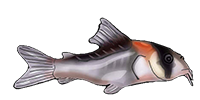Havaard Stoere wrote:Species in general will take care of them selves, and can still be harvested by ornamental fish catchers (who makes a decent living in a healthy and rewarding occupation). This includes species like H zebra, L24,L25,L273 etc. The fishing needs to be regulated eventually, but it can in principal go on forever. Fish farming is an industry to meet the demands of buyers thus earning money. We can drop the whole "Noah's Ark" thing. Species being kept and bred to later repopulate a previously destroyed habitat is fantasy. There is little or no conservation in fish farming. Sometimes and quite often it is the opposite of conservation. We should be concerned about the planned dams instead of being concerned about who's gonna breed the fish for the ornamental fish industry. It all boils down to managing human over population.
Janne wrote:The only place where a species can be preserved is in nature and their natural habitat... in the long term.
Exactly. To me, the pattern (i.e. the species, the biota) and the processes (i.e. the geography of the region) are intrinsically linked. They have co-evolved over millions of years together. Destroy the habitat and move the species into captivity, and the species are no longer part of the natural world, and are unlikely to ever be.
By all means breed them for the hobby, but lets not pretend that there is a grain of conservation value for them there.
If people want someone to blame for this, don't blame the Brazilian government for dam building, as they are just doing what any government would do; blame the Industrialised/industrialising world (i.e. us) for the insatiable demand for consumer luxuries made of materials, like aluminium.
The demand for these luxuries, such as those used in our fish tanks and computers, are creating this destruction. Hence, we are the
problem, not the
solution!
TwoTankAmin wrote:The small sampling of pl*co breeders I have met and/or corresponded with are mindful of genetic and inbreeding and normally keep their fish in species tanks and
I am less concerned about malicious cross breeding, just inadvertent hybridisation due to incorrect identification. Even on this website, only a very small handful of people can identify all those black and white lower Xingu species. Why is it that Janne and Yann have to answer almost every single "what is my
Hypancistrus" post?
For example,
is an incredibly rare fish. Is is possible that all 25 registered keepers are keeping that species, or that they have been misled, or wishfully identified their fish at this species?*. Isn't it more likely that most of the 53 registered keepers of the rare
are actually keeping the similar, common,
?
TwoTankAmin wrote:If one starts with a a group of 10 unrelated zebra plecos and is able to spawn them successfully, it would still be a few decades before they would even approach the point of being inbred.
Indeed, but people have and will, be buying breeding groups of sibling fish from other breeders.
TwoTankAmin wrote:they do cull.
Only the really responsible folk. I have seen deformed
H. zebra on sale, and I know that this might be limited example, but what breeder will cull $200 worth of fish, if it looks a little bit different?
* of course some of them may not own it at all






/g/s/1.jpg)

